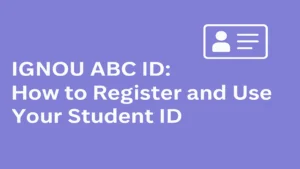Receiving your IGNOU results can be both exciting and nerve-wracking, especially if there’s any discrepancy in the grading. An incorrect result can affect your academic journey, delay your progress, and create unnecessary stress. Fortunately, IGNOU offers a well-defined process for students to appeal incorrect results, ensuring that fairness is upheld in the evaluation process.
In this comprehensive guide, we will walk you through the entire process of appealing for incorrect IGNOU results, covering everything from understanding common result errors to writing an effective appeal letter and following up with the university.
Introduction: Why Appealing for Incorrect IGNOU Results is Crucial
The Importance of Correct Results in Your Academic Journey
Correct exam results are essential in building your academic record. They determine your grade point average (GPA), eligibility for future courses, and even your career opportunities. A discrepancy in your results, whether it’s in assignment grading, theory exams, or practicals, can negatively impact your progress and future opportunities.
What Constitutes Incorrect IGNOU Results?
Incorrect results can arise in various forms:
- Errors in Assignment Grading: Missing marks or inaccurate grading of assignments can happen.
- Discrepancies in Exam Scores: Your theory or practical exam results may not reflect your actual performance.
- Technical Issues: Errors in online submissions or system glitches can lead to incorrect entries.
- Missing Entries: If a subject or exam score is missing from your result sheet, it could be due to a data entry issue.
Overview of the Appeal Process: Why It’s Essential
The appeal process is designed to address these discrepancies and ensure that your grades reflect your actual performance. If you believe your results are incorrect, it is crucial to follow the appeal procedure outlined by IGNOU to rectify the issue in a formal, systematic manner.
Common Reasons for Incorrect Results at IGNOU
Errors may occur due to:
- Mistakes made during the evaluation process by examiners or tutors.
- Miscommunication between the examiners and IGNOU’s administrative department.
- Online technical issues that may cause marks to be omitted or wrongly entered.
Understanding the IGNOU Result System
How IGNOU Grading and Evaluation Work
IGNOU follows a credit system and uses a letter grading system for evaluation. The grades range from ‘A’ (Excellent) to ‘E’ (Fail), with specific grade points associated with each grade. Your final marks are determined based on both your theory exam results and assignments.
Types of Results: Theory, Practical, and Assignment Scores
- Theory Exam Results: These typically carry the highest weight and are evaluated based on written exams.
- Practical Exam Results: Some programs include practical exams, which are also critical for grading.
- Assignment Scores: Assignments are integral to your grade and must be completed on time. They contribute to your overall marks and are factored in with theory exam results.
The Role of the IGNOU Grading System in Final Evaluation
IGNOU’s grading system ensures a fair evaluation. The marks you receive from assignments, practicals, and exams are converted into grades and then computed to generate your final result. Understanding this system helps you identify which areas may have been inaccurately graded.
How the Marking Scheme Impacts Your Final Grade
Each assignment, exam, and practical exam carries a certain weightage, and miscalculating or misreporting one of these scores can significantly affect your overall grade. Being aware of how each component is weighted will help you assess whether your result is incorrect.
Common Errors in IGNOU Results
Mistakes in Assignment Grading
Assignments play a crucial role in your final grade. Incorrect grading can occur if the evaluator misses points, provides inaccurate feedback, or misinterprets your work. Always double-check the grades given to ensure they match the work you submitted.
Errors in Theory Exam Scoring
Theory exams may be mistakenly scored, either due to human error in the evaluation or system errors during the process. If you suspect that your paper was not fully evaluated or graded incorrectly, it’s essential to act quickly to appeal.
Issues with Practical Exam Results
Practical exams can sometimes have discrepancies, especially if there’s a subjective evaluation involved or if there was confusion regarding the assessment criteria. If you feel that your practical exam was graded unfairly, it’s important to bring this up during the appeal process.
Technical Glitches: How Online Submissions Can Be Affected
Many IGNOU assignments and exams are submitted online, which introduces the potential for system errors. These can include missing entries, lost submissions, or delays in grade processing. These technical glitches can sometimes lead to incorrect results.
Misinterpretation of Marks or Missing Entries
If your result shows missing subjects or incorrect marks, it could be due to an error in data entry or a failure to process your exam results. In such cases, submitting an appeal ensures that your complete result is accurately reflected.
How to Check Your IGNOU Results Thoroughly
Step-by-Step Guide to Accessing IGNOU Results Online
To begin the process, access your IGNOU results through the official IGNOU website. Use your enrollment number and password to log in, navigate to the ‘Results’ section, and select the relevant semester or program to view your scores.
Cross-Checking Results with Your Assignments and Exam Papers
Once you’ve accessed your results, compare them with the assignments and exam papers you submitted. Ensure that every subject you took is included and that the marks reflect your efforts.
Verifying the Accuracy of Your Practical Exam Scores
Check the marks given for practical exams separately, as they are evaluated independently. If you notice discrepancies, make a note of the issue before filing an appeal.
Ensuring All Your Subjects Are Included in the Results
Sometimes, results for one or more subjects may be missing. If this occurs, check with your study center or faculty to ensure the submission and grading process was completed correctly.
Identifying Potential Errors: What to Look For
Look for missing marks, incorrect scores, or discrepancies in the grading of assignments. If something seems amiss, document the error with a screenshot and notes for your appeal.
When Should You Appeal Your IGNOU Result?
Recognizing Genuine Mistakes vs. Misunderstandings
Before filing an appeal, make sure that the issue is a genuine mistake and not a misunderstanding. Sometimes, discrepancies are due to incorrect perceptions or confusion regarding the grading system.
Signs That Your Result May Be Incorrect
- Missing or wrong grades
- Inconsistencies between your submitted work and the grade received
- Missing or incomplete results for practical exams
The Impact of Incorrect Results on Your Future Education and Career
Incorrect results can delay your academic progress, prevent you from qualifying for further studies, or affect job opportunities. Timely intervention through appeals can prevent future setbacks.
Deadlines for Submitting Appeals: Why Timing Matters
IGNOU has specific deadlines for submitting result appeals. If you miss these deadlines, you may lose your chance to get the results corrected. Act quickly and stay informed about the appeal timelines.
How to File an Appeal for Incorrect IGNOU Results
The Formal Procedure to Appeal Your Result
To appeal your IGNOU result, you must follow the university’s formal procedure. Typically, this involves submitting a written appeal to the university’s result processing department or academic unit.
Required Documents for Filing an Appeal
You will need to submit your appeal letter along with supporting documents such as:
- A copy of your result
- A copy of your assignment or exam paper (if relevant)
- Any other documentation to support your claim
Steps to Follow on the IGNOU Portal for Result Appeals
- Log in to your IGNOU portal.
- Navigate to the “Result” section.
- Click on “Submit Appeal” or “Appeal for Result Review.”
- Fill out the form and attach all necessary documents.
Contacting the Right Department or Authority at IGNOU
Make sure you direct your appeal to the correct department—this could be the result department or your specific faculty. Double-check the university’s website for contact details to avoid delays.
Writing a Clear and Effective Appeal Letter
In your appeal letter, clearly mention the mistake you believe occurred, provide relevant details (such as exam dates, courses, and specific errors), and request a resolution.
Writing an Effective Appeal Letter to IGNOU
Structuring Your Appeal Letter Correctly
Your appeal letter should be concise, polite, and to the point. Start by addressing the concerned authority, then clearly describe the discrepancy, and conclude with a request for a review.
Key Information to Include in the Appeal Letter
Include your:
- Enrollment number
- Course and subject details
- Specific error or discrepancy noticed
- Relevant supporting documents
- Contact information for follow-up
Sample Appeal Letter for Incorrect IGNOU Results
(Include a basic format or template letter that students can use for their appeal)
Common Mistakes to Avoid in Your Appeal Letter
- Being rude or aggressive in tone
- Not providing all necessary details or documentation
- Failing to explain the issue clearly
What Happens After You Submit Your Appeal?
The Review Process: How IGNOU Handles Appeals
Once your appeal is submitted, it will be reviewed by the concerned department. They may cross-check the results with examiners, tutors, or technical support teams to identify errors.
Timeframe for Processing Result Appeals
The process can take anywhere from a few weeks to several months, depending on the complexity of the issue and the department’s workload.
What to Expect During the Review Process
You may be contacted by IGNOU if they require additional information or clarification. It’s important to stay responsive to avoid delays.
Possible Outcomes: What Happens if Your Appeal Is Accepted
If your appeal is accepted, the incorrect results will be corrected, and you’ll receive updated marks. This may also involve regrading assignments, exams, or practicals.
What Happens if Your Appeal Is Rejected?
If your appeal is rejected, you may have the option to request revaluation or rechecking. In some cases, you can approach higher authorities within IGNOU to further review the issue.
How to Follow Up on Your Result Appeal
Monitoring the Status of Your Appeal
Keep track of your appeal’s status by checking the official IGNOU portal. Follow up with the department if necessary.
Who to Contact for Follow-Up Queries
If your appeal is taking longer than expected, reach out to the exam department or result office. They will provide you with updates on the progress of your case.
How to Get Additional Assistance if Your Appeal Is Delayed
If the appeal process is delayed, escalate your concern to a higher authority or contact your study center for further guidance.
Understanding the Limitations and Your Next Steps
Sometimes, despite the best efforts, appeals may not result in the desired outcome. It’s important to explore your next steps, such as revaluation or pursuing further education options.
Steps to Take if Your Appeal Is Rejected
Understanding Why Your Appeal Was Denied
If your appeal is rejected, it’s essential to first understand why. Possible reasons include insufficient evidence, failure to meet deadlines, or the result being considered accurate after re-evaluation. Requesting detailed feedback from the concerned authority will give you a clearer picture of the reasoning behind the decision. Understanding the rejection will guide your next steps and help you prepare for future actions.
How to Approach the Situation Professionally
Even if your appeal is rejected, it’s crucial to maintain professionalism. Avoid becoming defensive or angry; instead, approach the situation calmly and objectively. Review any feedback received, and ask if there are any further steps you can take. Keep communication polite and professional when contacting IGNOU authorities for clarification.
Exploring Other Options: Revaluation and Rechecking
If you’re dissatisfied with the appeal decision, you may request a revaluation or rechecking of your exam paper or assignments. The revaluation process involves re-assessing the exam answer sheets and assignments by a different evaluator to check for any possible grading errors. Rechecking focuses on verifying whether all questions were marked. Be aware that revaluation or rechecking may come with additional fees and time constraints, so ensure you understand the process before proceeding.
How to Prevent Future Result Issues
To prevent future result discrepancies, ensure that you submit assignments and exams on time, follow the correct submission guidelines, and keep copies of all your work. Stay proactive and monitor your results regularly to identify any issues early on. Furthermore, always communicate any concerns with your study center or tutors promptly.
How Revaluation and Rechecking Can Help in Result Discrepancies
Understanding the Difference Between Revaluation and Rechecking
Revaluation and rechecking are two distinct processes:
- Revaluation involves re-assessing your entire exam paper by a different examiner to check if any marks were missed or misinterpreted.
- Rechecking involves verifying that all questions were marked and ensuring that no errors occurred during the scoring process.
Understanding the difference is crucial when deciding which option to pursue.
When Should You Opt for Revaluation or Rechecking?
If you believe there was a mistake in how your exam was graded—whether it’s missed marks or incorrect evaluation—request revaluation. If you suspect there might have been an oversight, such as missing answers or incorrect total marks, rechecking could be more suitable.
The Process of Revaluation at IGNOU
The process of revaluation typically involves submitting a request through the IGNOU portal and paying a fee. After submission, your exam paper is reassessed by a different examiner. You will receive the results of the revaluation within a few weeks. If any changes are made to your original grade, the corrected marks will be updated in your academic records.
Fees and Timeframes for Revaluation Requests
IGNOU charges a fee for revaluation requests, which varies depending on the course or exam. The timeframe for receiving revaluation results is generally a few weeks after submission. Make sure you keep track of deadlines for submitting revaluation requests to avoid missing the opportunity.
What to Do if Revaluation Results Differ
In the event that your revaluation results differ from the original, the updated marks will be recorded. However, if you still believe there is an error, you can escalate the matter further to IGNOU authorities. Keep your communication clear and professional when requesting additional reviews.
The Role of IGNOU Study Centers in Handling Result Discrepancies
How Study Centers Can Assist in the Appeal Process
IGNOU study centers play a pivotal role in supporting students. If you notice a discrepancy in your results, your study center can guide you through the appeal process and help you submit the necessary documentation. Study centers are often the first point of contact when dealing with issues related to assignments, exams, and results.
Understanding the Support Offered by IGNOU Tutors
IGNOU tutors provide valuable support in understanding your academic performance. They can clarify any doubts you might have regarding your assignments, exam questions, or marks. Reaching out to your tutor before filing an appeal can help identify any mistakes that might have been overlooked.
Getting Advice on Common Result Issues from Study Center Staff
Study center staff are often well-versed in handling result-related issues. They can offer advice on whether the discrepancy you’re facing is common, help you navigate the appeal process, and ensure that your submission is correct. Their assistance can significantly streamline the appeal process.
Communication Channels Between Students and Study Centers
Ensure you know the best ways to contact your study center, whether by email, phone, or in-person visits. Most study centers offer contact details for academic queries, including appeal-related issues. Always maintain clear and concise communication to expedite the process.
Avoiding Common Mistakes in the Appeal Process
Avoiding Hasty Appeals Without Proper Evidence
Before submitting an appeal, make sure you have solid evidence supporting your case. This includes comparing your original work with the grades awarded, reviewing feedback, and verifying all your results. Rushed or unsupported appeals are less likely to succeed.
Ensuring You Don’t Miss Important Deadlines
Pay attention to deadlines for filing appeals, revaluation requests, and result corrections. Missing these deadlines could mean that you forfeit your opportunity to rectify the issue.
Double-Checking Your Appeal Before Submission
Before submitting your appeal, review it for clarity, accuracy, and completeness. Ensure all required documentation is attached and that the appeal is addressed to the correct department.
How to Maintain Professionalism in Your Communications
Always remain professional and respectful in your communications with IGNOU staff. Avoid using aggressive language or demanding behavior. Instead, maintain a polite and cooperative tone to foster a positive resolution.
Conclusion: Ensuring a Smooth Process for Your Result Appeal
Recap of Steps to Appeal for Incorrect IGNOU Results
To appeal an incorrect IGNOU result, carefully follow the official appeal process, gather all relevant documentation, write a clear appeal letter, and submit your request within the specified timeframes. If your appeal is rejected, you can explore revaluation or rechecking options.
How to Stay Calm and Patient Throughout the Process
While waiting for your appeal results, stay patient and remain positive. The process can take time, but remaining calm and proactive will help you stay on track. Use this time to continue your studies and focus on upcoming assignments or exams.
Final Tips for Avoiding Future Result Discrepancies
Ensure that you follow proper procedures for assignment submissions, keep records of your work, and remain engaged with your study center for support. By staying organized and aware, you can minimize the risk of result discrepancies.
Encouragement for Students Facing Result Challenges
Dealing with incorrect results can be frustrating, but it’s essential to remember that the process is there to ensure fairness. With the right steps and patience, you can resolve any issues and continue on your path to academic success. Good luck!
Frequently Asked Questions (FAQs) About IGNOU Result Appeals
How long does it take for IGNOU to process an appeal?
The processing time for an appeal can vary depending on the nature of the issue and the department handling it. Typically, it takes a few weeks to a couple of months for your appeal to be processed and for you to receive an update.
Can I appeal if I missed the result deadline?
If you missed the appeal deadline, it might be more difficult to get your result reviewed, but you can contact the relevant IGNOU authorities to explain your situation. In some cases, extensions or special considerations may be granted.
What if my practical exam result is wrong but not my theory exam score?
If only your practical exam result is incorrect, you can specifically appeal for a review of that component. Provide evidence of the mistake and any supporting documentation, such as your practical exam record or the grading rubric.
How can I prevent result-related issues in the future?
To prevent future result discrepancies, always double-check your assignment and exam submissions, adhere to deadlines, and ensure that you receive confirmation of your submission. Additionally, stay in regular contact with your study center or tutors to resolve any concerns early on.
Related Posts:
- IGNOU Toppers: How to Achieve a High Score, Best & Step-by Step Guide 2025
- How to Choose the Right IGNOU Programs: A Comprehensive Guide 2025
- The Future of ODL Program in India: Trends, Challenges, and Opportunities 2025
- 38th IGNOU Convocation 2025: Registration, Fee Payment, Criteria, Best Guide
- NTT IGNOU Admission 2025: Key Dates, Fees, Process, Best Guide




